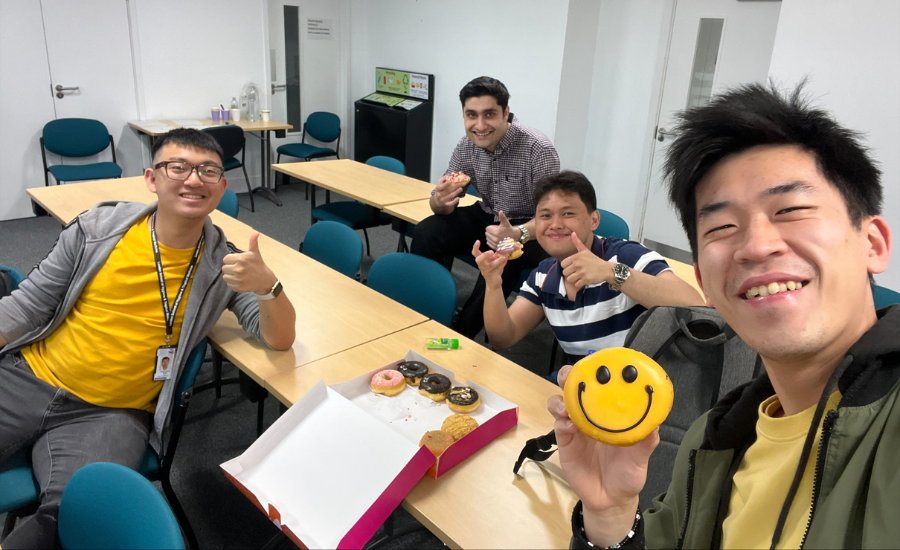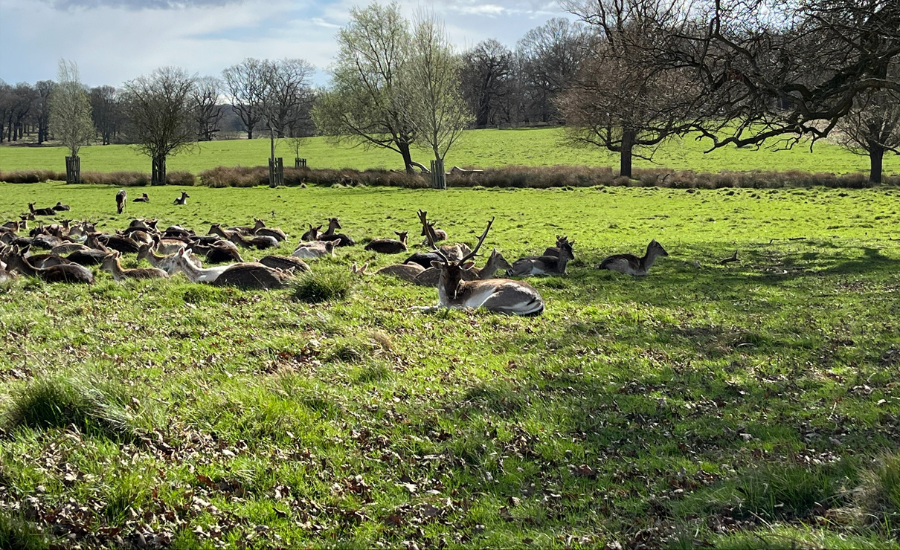5 reasons to study part time by split study at LSHTM
16 January 2025 London School of Hygiene & Tropical Medicine London School of Hygiene & Tropical Medicine https://lshtm.ac.uk/themes/custom/lshtm/images/lshtm-logo-black.png
Henry (front) and students recharging themselves for revising more immunology
I was seeking a flexible approach that would allow me to evaluate my next career steps by diversifying my opportunities and, progressing towards postgraduate education in infection biology related immunology. Like many of the MSc at LSHTM, MSc Immunology of Infectious Diseases offers a flexible, split study option. Here are 5 reasons why I did split study:
1. Tailoring additional research elements to my MSc in this active and renowned global health research institute
Most of my undergraduate degree time saw the wet laboratory sessions turned into online classes, as a postgraduate, I believe tailoring and making better use of my time at LSHTM will enhance my competitiveness in the job market, and boost my first (and many yet-to-come) step towards achieving a professorship, that's why I chose to study part-time.
After taking the Autumn term modules, I took my gap year straight after to focus on enriching my hands-on experience in experimental designs and enhancing my exposure to how laboratories are operated and managed optimally, before returning to finish the rest of the programme.
During my first year, I was introduced to the foundational contents and latest topology of immunology. Having my gap year subsequently allowed me to full-time participate in a research lab setting to further apply and consolidate taught contents delivered prior while retaining the connection with the school, including my supportive classmates despite we no longer going to lectures together, which worked out nicely for me.
2. Boosting my study: Transforming knowledge on books to know-how at the lab
By adding the elements of research lab work during my gap year, I was lucky to gain breadth and depth beyond a typical MSc route – sometimes nicknamed a staff MSc.
I was lucky to be welcomed by the staff and research students when I joined the Malaria Centre, where they offered me numerous shadowing opportunities, from making the reagents from scratch to acquiring data from cutting-edge equipment. There were also opportunities for getting in-depth training on the theories of immunoassays and practising specific laboratory techniques in live action. Very different story from reading them in the methods section in the papers. This also laid the foundational understanding ahead of my summer project taken place after my gap year.
3. Broadening my network
The Malaria Centre and other Centres at the school organize seminars and networking-based activities all year round, and throughout my 2 years in LSHTM, I found these events to be a really good platform for knowing whereabouts the field is right now and driving towards the future. More importantly, meeting staff from different departments or speaking with external guests gave me a better picture of the significance of extensive, multidisciplinary collaborations in promoting global health that serves different demographics.
4. Setting a quest to better evaluate myself
Although I have been longing to gain exposure working in serological and parasitical research settings, with not much experience shared by previous split study students, it was a leap of faith when my gap year started. There were standardised procedures for part-time students to join in-house research at LSHTM, perhaps because the majority of students in MSc IID completed their studies full-time or in other MSc, completed part-time over the years.
The ongoing uncertainty while exploring the uncharted territories did induce a certain extent of anxiety but was manageable thanks to support from people around me that ultimately settled what I would be doing for my gap year. At the start of my gap year, it felt like sitting on a train changing tracks at a crossing, where things slowed down and wobbled a lot. This was the period where I questioned myself frequently on whether detouring via this “gap year track” was the right decision. Yet, the forward momentum gradually picked up again after the crossing, and I was able to get involved in projects and experiments. Notably, my gap year further benefited me from having 1:1 appointments with approachable career consultants at LSHTM, where they introduced ideas that allowed me to better strategise my gap year in personal development and evaluate my strengths and weaknesses that can be advantageous to my future job application process.
Highlights of my gap year include making a short presentation at Malaria Retreat, optimizing the use of lab resources, exposing myself to the publication process, demonstrating at student practicals, and multitasking between lab work and other duties. All in all, I have gained a wider, relevant, transferable skillset that I believe will benefit my career development.
5. Enjoying flexibility
This flexible mode of study made my involvement in the research lab possible, and the gap year does not require it to be academic-related. It's up to you how much you can do in 1 year, from a regular schedule if you complete your MSc in one year.
My top tips
Before your course starts in September, you will also be greeted by your programme director(s) on the exact starting date of your gap year, and they will be there for you throughout your course. If you wish to use your gap year for career development, perhaps reaching centres at LSHTM, lab groups, or external organisations that interest you via email could help you draw your blueprint earlier and further smoothen the transition period towards your study and gap year.
Additionally, there is a considerable amount of engagement required for preparing the summer project during the gap year. It varies between courses, and in MSc IID, it mainly takes place in January to February (summer project selection) and March to May (research ethics and other related training and applications). Some efforts are also needed to retain the knowledge and lab skills taught before the gap year, as the depth of course contents delivered after the gap year will be at the same level as the full-time students. I do wish my memory T and B cells could have developed memories towards the lecture contents!
Explore different ways to study at LSHTM
If you have also found doing an MSc part-time by split study at LSHTM is something that you envision, I hope this blog could be a useful and inspiring account for you to explore the potential and possibilities that are open to you taking the split study route. I am grateful for the supportive environment that made my journey at LSHTM so fruitful - I would say more rewarding than what I originally imagined when I started my MSc.
- Discover MSc Immunology of Infectious Diseases.
- Contact Henry via our contact student & alumni ambassador page.
- Discover ways to study at LSHTM
